CEIBS Hosts 2024 High-Quality Business Education and Case Method Conference for MBA Educators
The "2024 High-Quality Business Education and Case Method Conference for MBA Educators" took place on October 12 at the CEIBS Shanghai campus as part of the institution's 30th anniversary celebrations. The event was co-organised by the Association of Chinese Graduate Education and CEIBS, under the guidance of the China National MBA Education Supervisory Committee.
Prominent experts from the education sector attended the conference, including Chen Fangruo, Vice Director of China National MBA Education Supervisory Committee and Dean of Antai College of Economics & Management at Shanghai Jiao Tong University; Wang Hong, President and Professor of Management at CEIBS and Hengdian Group Chair in Management; Wang Ping, Director of the Office of Secretariat China National MBA Education Supervisory Committee and Secretary-General of MBA Committee of Association of Chinese Graduate Education; He Wensheng, Member of China National MBA Education Supervisory Committee and Dean of School of Management at Lanzhou University; Shang Wenjiang, Dean of the Business School at China University of Political Science and Law and Member of the 14th CPPCC; Huo Jiazhen, Chairman of Shanghai Management Science Society and Former Dean of the School of Economics and Management at Tongji University; Frank Bournois, Vice President and Dean of CEIBS; Zhang Weijiong, Vice President and Co-Dean of CEIBS; and Ma Lei, Secretary of CPC Committee of CEIBS.
Representatives from Harvard Business Publishing Education, Ivey Publishing, and The Case Centre also attended and delivered speeches. The conference, which attracted nearly 300 MBA education leaders and case centre directors from over 170 institutions nationwide, focused on enhancing the educational experience through case studies and promoting high-quality China-themed cases globally.
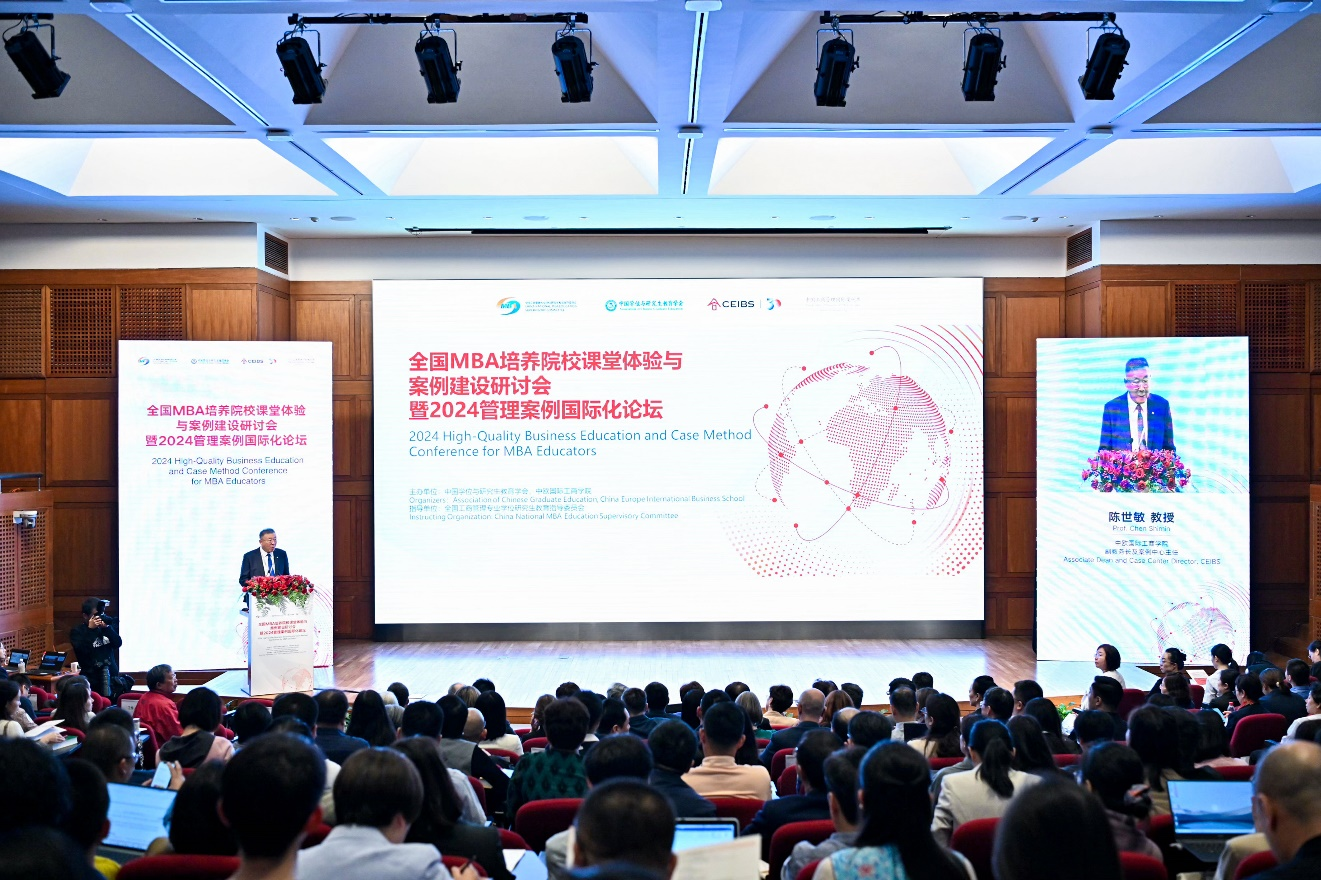
Chen Shimin, Associate Dean and Director of the Case Centre at CEIBS, moderates the conference
The conference commenced with an opening address by Chen Fangruo, representing the China National MBA Education Supervisory Committee. He emphasised the pivotal role that China's MBA education has played in shaping business leaders and driving the country's economic and social progress over the past three decades since its inception in 1991. Chen also acknowledged the ongoing challenges facing MBA education in China, particularly the need for high-quality case studies, which are vital for top-tier MBA programmes. To overcome these challenges, he urged educators to step out of their comfort zones. "China has accumulated a wealth of management practices since its reform and opening up," he stated. "It's crucial for our faculty to reach out and better bridge the gap between theory and practice."
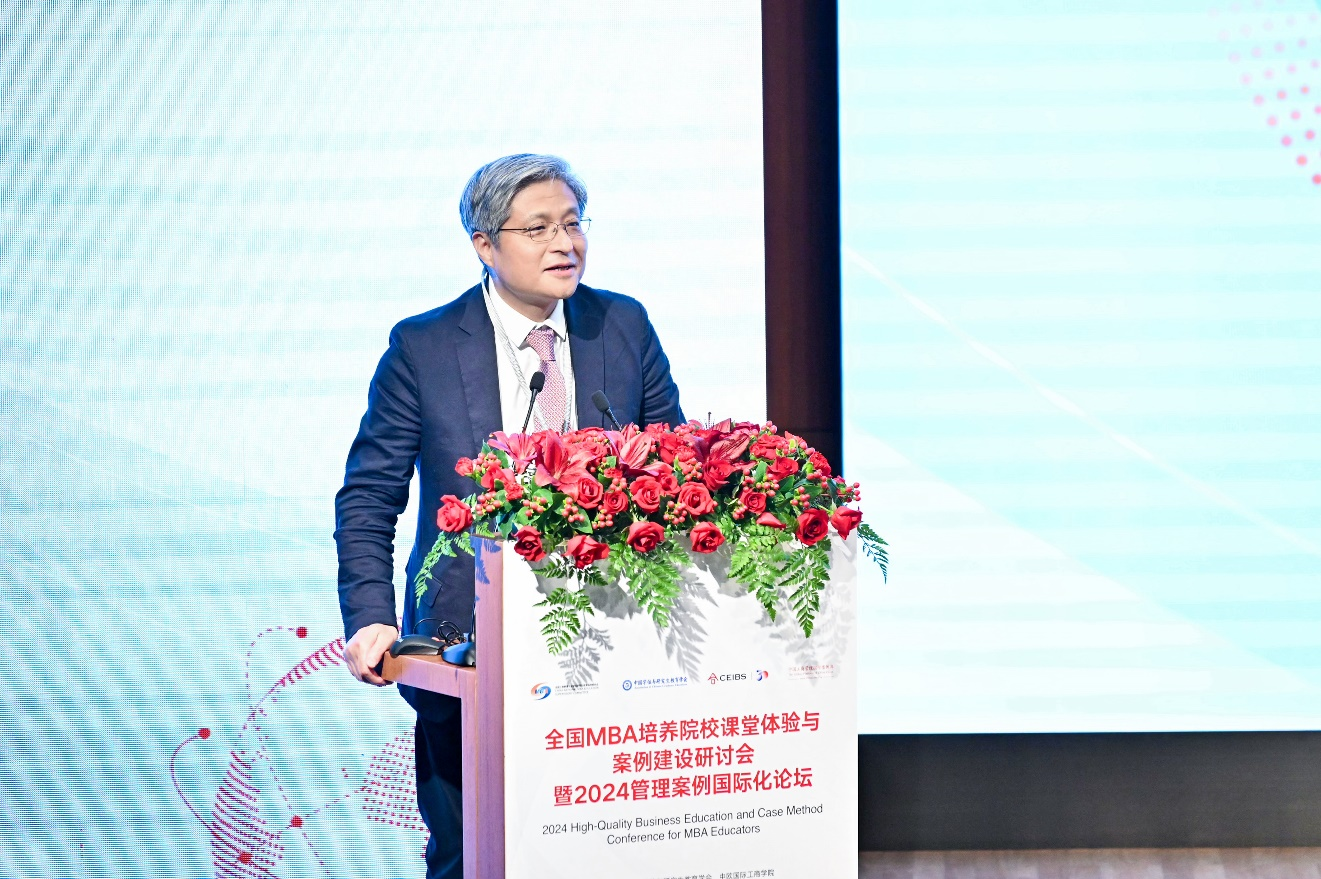
Chen Fangruo, Vice Director of China National MBA Education Supervisory Committee and Dean of Antai College of Economics & Management at Shanghai Jiao Tong University, gives an opening address
Following a warm welcome to all attendees, CEIBS President Wang Hong delivered a keynote speech titled "Navigating New Challenges for Business Schools: A CEIBS Perspective." In her address, she reflected on CEIBS' dedication to its "China Depth, Global Breadth" positioning over the past three decades and highlighted the school's case studies, which have garnered significant attention from national and regional education policies and received strong support from globally recognized case centres such as Harvard Business Publishing Education, Ivey Publishing, and The Case Centre.
President Wang emphasised that business education is on the verge of global change. To navigate this evolving landscape, she urged business schools to embrace innovation and explore new educational models. She also stressed the importance of developing China-centric cases to tell China's story and amplify China's voice on the global stage. At the same time, integrating high-quality case studies from international case libraries is crucial to driving the transformation of management education.
Looking ahead, President Wang called for a new approach to business education that incorporates diverse teaching methods, including case studies, to cultivate well-rounded, application-oriented management professionals for the new era. These professionals, she noted, will serve as ambassadors of Chinese culture, advocates of the Chinese experience, innovators of Chinese theories, and pioneers shaping China's future.
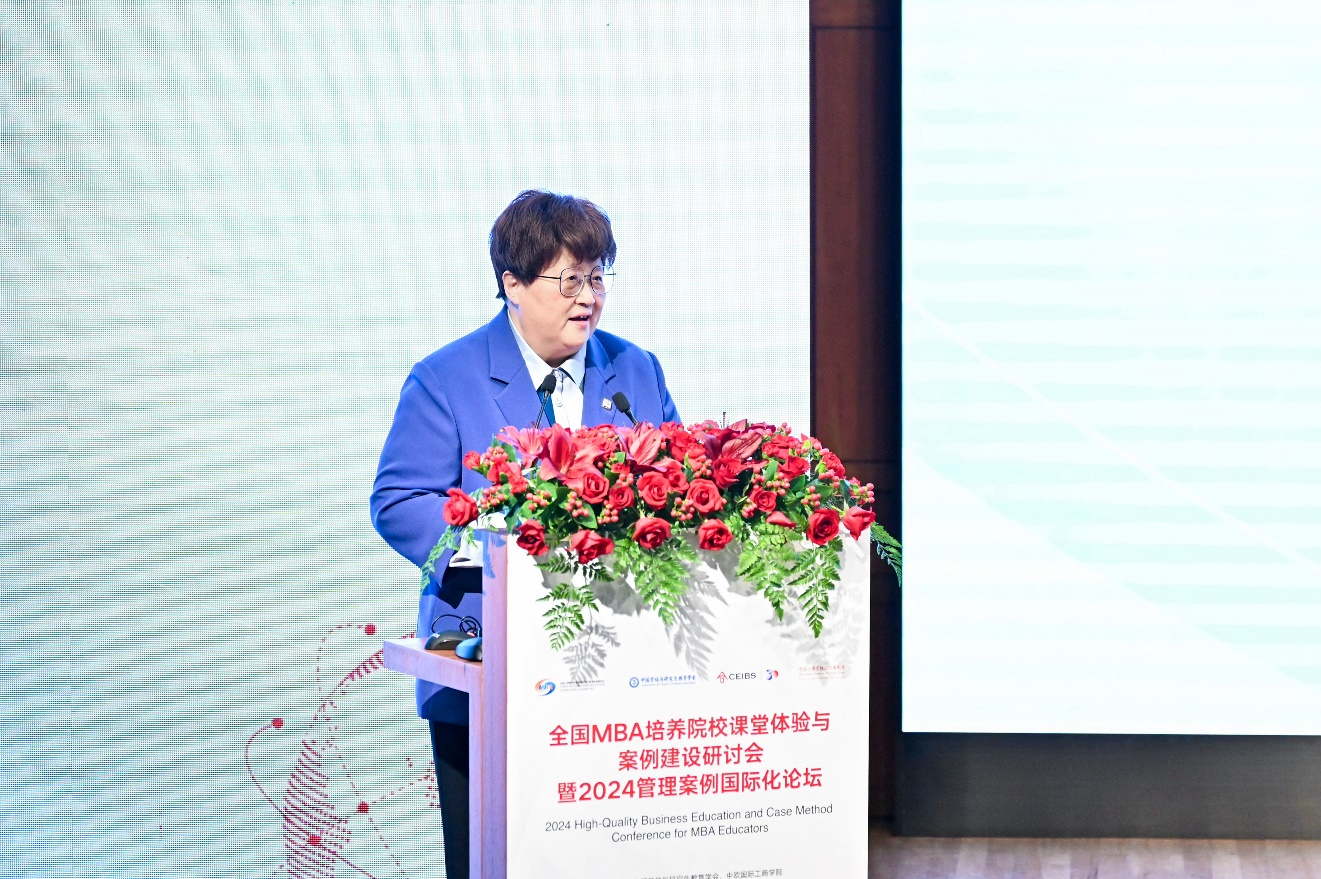
Wang Hong, President and Management Professor of CEIBS and Hengdian Group Chair in Management, delivers a keynote speech
Du Yunzhou, Director of the Institute of Management Philosophy and Methodology at Southeast University, delivered a keynote speech titled "Dilemmas Faced by Business Schools: Exploring the Epistemology of Management Education." He highlighted the growing concern about the widening gap between theory and practice in management research within business schools, as well as the lack of emphasis on philosophy and methodology. To address these issues, Prof. Du stressed the importance of a deeper exploration into the origins of management knowledge and its application in research that combines both a global perspective and strong "China Depth."
Additionally, he introduced an innovative approach to theorising through philosophy, which accounts for practical complexity by refining and complexifying existing theories.
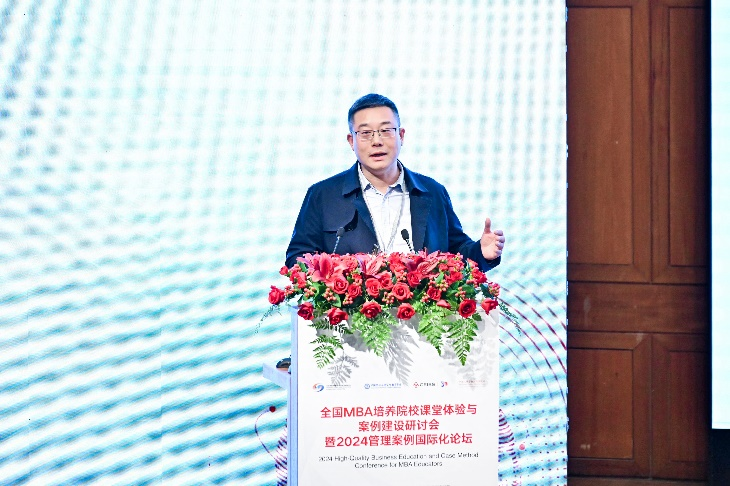
Du Yunzhou, Director of the Institute of Management Philosophy and Methodology at Southeast University, delivers a keynote speech
The first sharing session, titled "Enhancing the Classroom Experience in Business Schools," was led by Zhang Ying, Associate Dean of the Guanghua School of Management and Director of the Management Case Research Centre at Peking University. His presentation, "The Evolving of Business Education in China: A Perspective through Case Teaching," addressed critical topics such as the mission of case studies in China, the differences between China-focused cases and international ones like those from schools such as Harvard, and the balance between internationalisation and localisation in business education.
By drawing comparisons between the development of business education in the United States, Europe, and China, Prof. Zhang examined the opportunities and significance of creating high-quality case studies with distinct Chinese characteristics. He also highlighted the innovative potential for teaching, research, and the development of a case study ecosystem in the digital era.
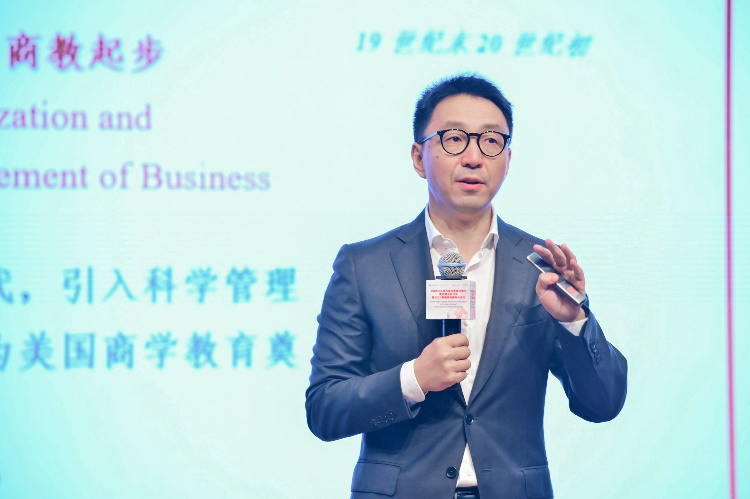
Zhang Ying, Associate Dean of Guanghua School of Management and Director of the Management Case Research Centre at Peking University?, kicks off the first thematic sharing session
Ye Weiling, Director of the Faculty Development Centre (FDC) at the College of Business, Shanghai University of Finance and Economics (SUFE), delivered a presentation titled "Empowering Business Education: Enhancing Teachers' Sense of Fulfilment and Achievement." She outlined various initiatives undertaken by the SUFE, which was established to strengthen MBA teaching and support the development of young faculty members at both the early and later stages of their careers.
Ye discussed how the FDC conducted research to identify the specific teaching needs of business school faculty. Based on these insights, the centre has developed targeted action plans to boost classroom engagement, improve teaching skills, and enhance faculty members' sense of career achievement.
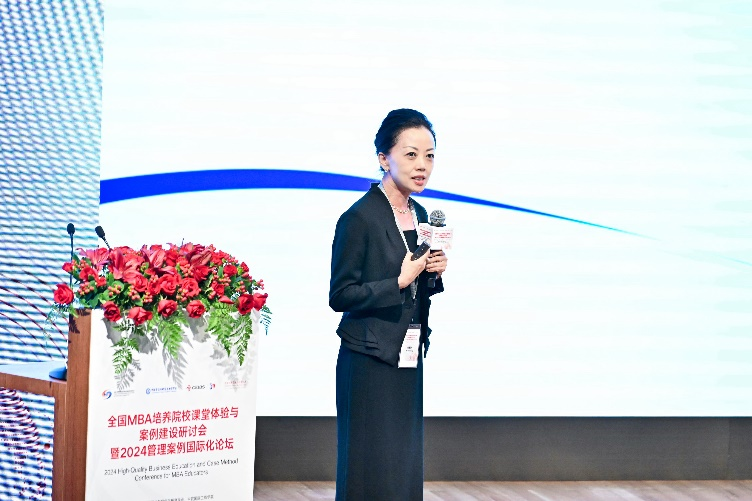
Ye Weiling, Director of Faculty Development Center, College of Business, Shanghai University of Finance and Economics, gives a speech
In a presentation titled "Empathy, Resonance, Co-creation and Joint Progress: Reflection on Case Teaching," Liu Gang, the Wu Yuzhang Distinguished Professor at the School of Business, Renmin University of China, offered an educator's perspective on the function of case studies. Drawing on his extensive research and practical experience in the field, Prof. Liu advocated for a shift from a student-centred teaching model to a more participatory, co-creative approach, which he believes more effectively captures the essence of case studies.
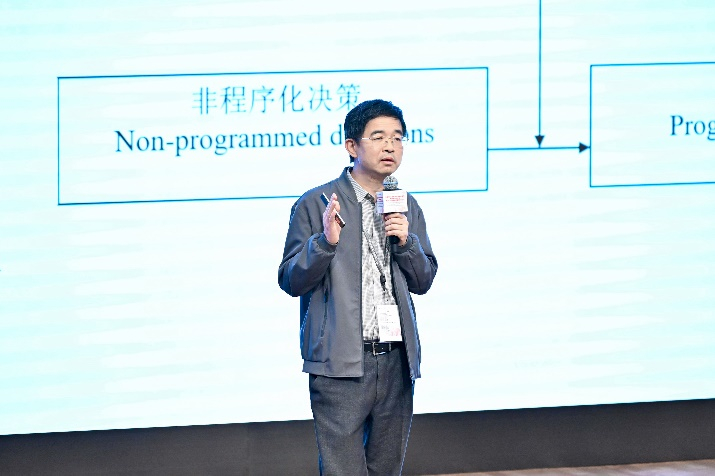
Liu Gang, the Wu Yuzhang Distinguished Professor at the School of Business, Renmin University of China, gives a speech
During the morning panel discussion, moderated by Prof. Chen Shimin, an engaging conversation unfolded among the three guest speakers. Zhang Ying addressed the challenge that business school faculty often face in balancing teaching and research but expressed optimism that this balance becomes more achievable as their careers progress. Ye Weiling echoed this view, noting that young faculty members often have to choose between research and teaching in the early stages of their careers, and benefit significantly from the support and guidance provided by their institutions. Liu Gang recommended that young faculty members should observe the classes of more experienced colleagues, engage in discussions with business leaders, and actively mentor students in their thesis work.
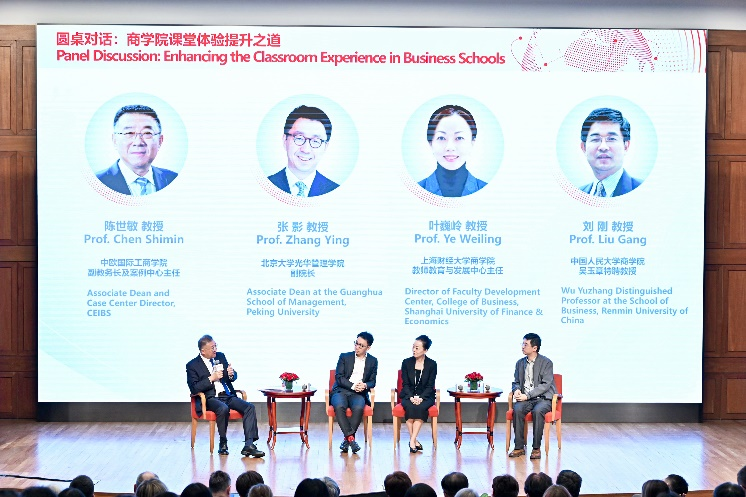
Chen Shimin moderates a panel discussion on "Enhancing the Classroom Experience in Business Schools"
At the close of the morning conference, He Wensheng provided a summary of the guest speakers' remarks. He emphasised the importance of case studies as a vital tool for knowledge creation and theoretical development. However, he also noted that while the case study method has a century-long history, it must evolve and adapt to the age of artificial intelligence, a pressing issue that warrants careful consideration.
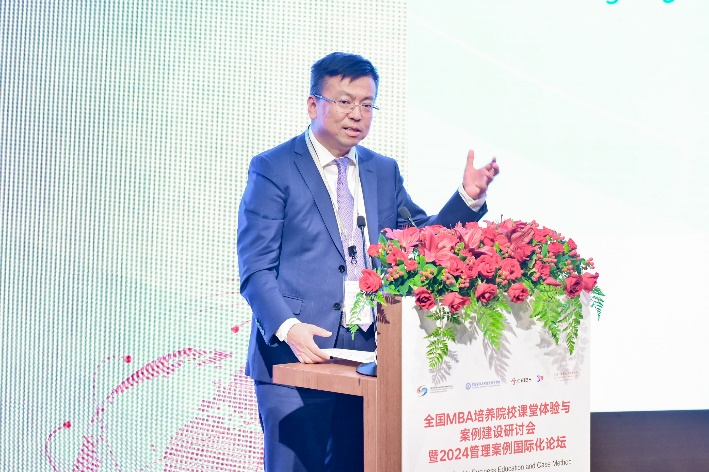
He Wensheng, Member of China National MBA Education Supervisory Committee, and Dean of School of Management at Lanzhou University, summarises the morning conference
The afternoon conference featured two thematic sharing sessions, moderated by Xu Leiping, Assistant Director of the Case Centre at CEIBS. Representatives from Harvard Business Publishing Education, Ivey Publishing, and The Case Centre kicked off the session with panel speeches. These internationally recognised case libraries set a global standard for case studies and are widely used by major business schools around the world, significantly enhancing the global relevance of these schools and elevating the quality of education.
Nicole Harris, Senior Director of Product Management at Harvard Business Publishing Education, addressed the scepticism and challenges that AI presents for the case method in her presentation, "Why the Case Method Is More Relevant than Ever in the Age of AI." Drawing on insights from Nitin Nohria, former Dean of Harvard Business School, Harris highlighted the enduring value of case studies. "The case method cultivates the capacity for critical analysis, judgment, decision-making, and action," she noted. In an AI-driven world, she emphasised, case studies play a crucial role in preparing individuals for case analysis, discernment, bias recognition, and human-AI collaboration.
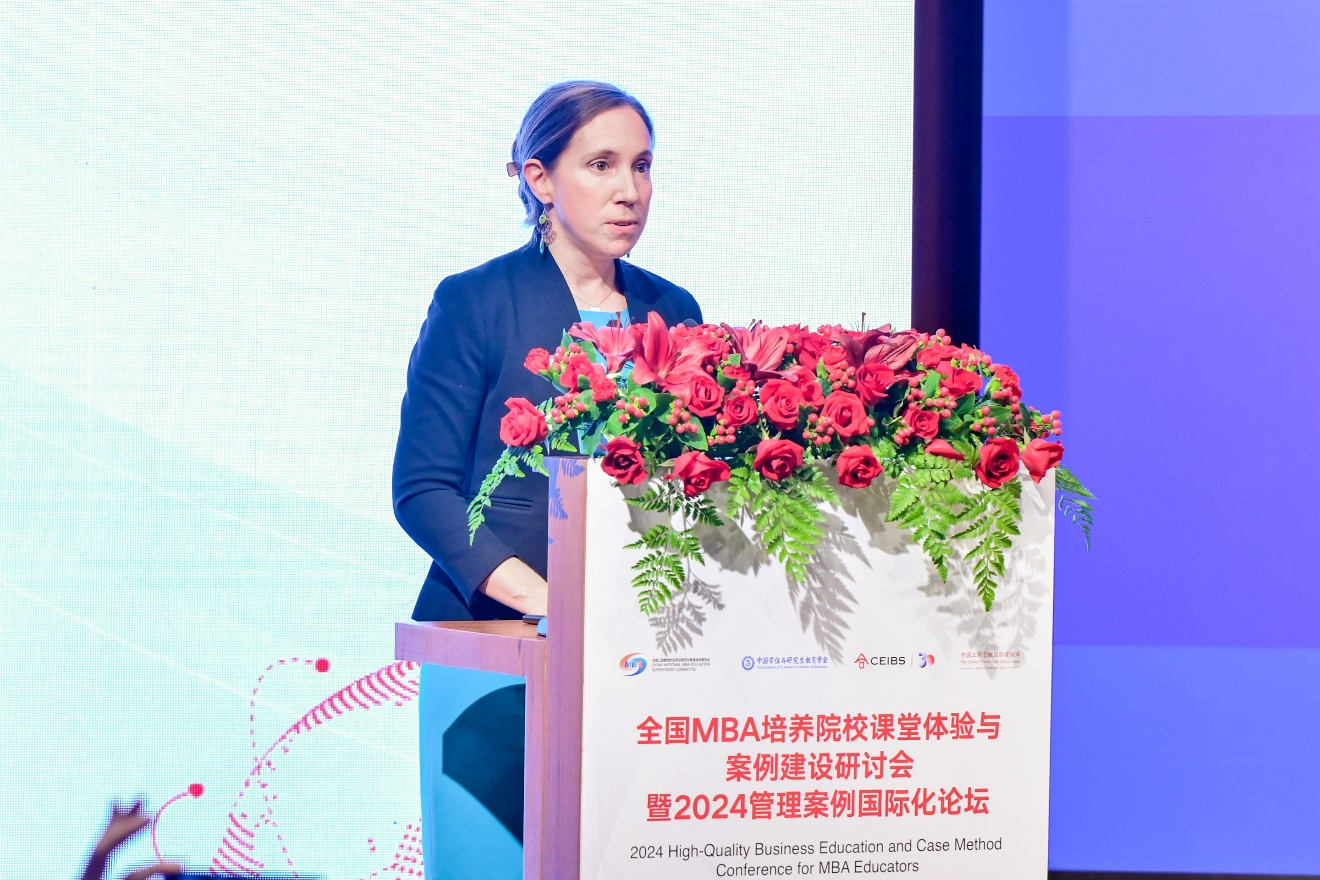
Nicole Harris, Senior Director of Product Management at Harvard Business Publishing Education, gives a speech
Candis McInnes, Executive Director of Ivey Publishing, shared her insights in a presentation titled "What Makes a Best-Selling Case." She began by outlining the criteria for a great case and then shifted focus to China's multi-sector growth, emphasising its global economic significance. McInnes explained that the growing demand for China-themed cases at international business schools is fuelled by innovation and technological advancement, sustainability, and the global expansion of Chinese companies. She concluded with advice for case writers: "Think about the type of case your class needs when you're writing it - that's the key to creating a compelling case."
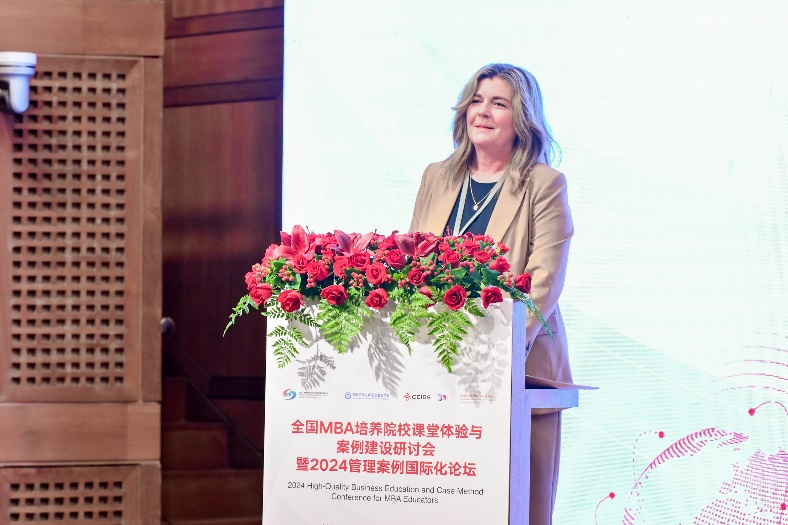
Candis McInnes, Executive Director of Ivey Publishing, gives a speech
In her presentation, "Creating Impact with High-Quality Chinese Cases," Vicky Lester, CEO of The Case Centre, shared insights on the latest trends in business school case studies, why it is vital to recognise the importance of the case method, and the recognition portfolio for outstanding case authors and educators. Lester noted a rising student interest in case studies that are grounded in local contexts, feature diverse protagonists, and address timely, relevant topics. She also highlighted the growing popularity of new and evolving case formats, such as compact cases and real-life scenario simulations.

Vicky Lester, CEO of The Case Center, gives a speech
Prof. Chen Shimin, reflecting on CEIBS' journey in case development and the establishment of the Global Platform of China Cases (ChinaCases.Org), shared his insights on promoting knowledge creation and dissemination through high-quality case studies. He emphasised the equal importance of teaching and research, highlighting the critical role that high-quality cases play in maintaining academic excellence at CEIBS.
Chen reviewed the progress CEIBS has made in case development, noting the international reach of its cases to more than 80 countries and regions, due to their inclusion in leading global case libraries. ChinaCases.Org currently holds more than 3,000 cases, with a cumulative usage of approximately 1.29 million copies, fostering deeper exchanges between CEIBS and business schools worldwide.
Chen also announced that the 2024 Annual Meeting of the International Community of Case Publishers (ICCP) will be held from October 15-18 at CEIBS' Beijing campus. The ICCP comprises prestigious institutions that specialise in case development and distribution, with CEIBS being the sole representative from the Chinese mainland. This event is a testament to CEIBS' commitment to collaborating with global partners and advancing management education through case studies.
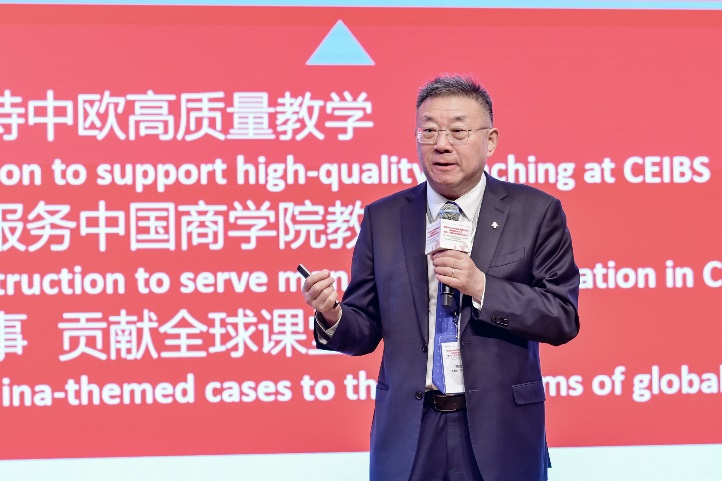
Chen Shimin, Associate Dean and Director of the Case Centre at CEIBS, gives a speech
The conference continued with the award ceremony for the "Outstanding Contribution to the Case Method Award 2024," presented by The Case Centre. This prestigious accolade was awarded to Prof. Chen Shimin, marking the first time an individual from China has received this honour. The award was presented by Vicky Lester, Wang Hong, and Frank Bournois.
The award is evaluated by The Case Centre's Board of Trustees and recognises individuals who are not only committed case writers and teachers but have also gone the extra mile "above and beyond the call of duty" to promote the case method. Prof. Chen was selected for this award by the Board for the extraordinary impact he has had on advancing the case method in China, and on bringing China-focused cases to the global business education sector.
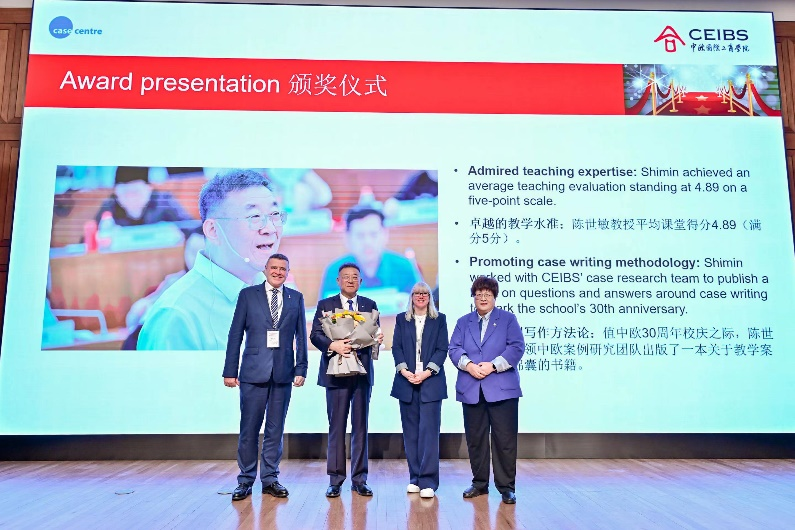
Vicky Lester, Wang Hong and Frank Bournois present the "Outstanding Contribution to the Case Method Award 2024" to Chen Shimin.
The afternoon panel discussion, moderated by Wang Taiyuan, Deputy Director of the DBA Programme and Professor of Entrepreneurship at CEIBS, brought together representatives from global case libraries to explore the development and publication of innovative case studies and their classroom implementation. While the panel agreed on the need to transform traditional evaluation standards, they emphasised that the primary measure of a quality case remains its practical application in the classroom.
The conference participants interacted with the panellists on a range of topics, such as the ideal scale of companies featured in case studies and the global relevance of China-focused cases published on international platforms. The consensus was clear: "China-themed stories" have the potential to enrich global business education and should be more widely incorporated into curricula around the world.

Wang Taiyuan, Deputy Director of DBA Programme and Professor of Entrepreneurship at CEIBS, moderates a panel discussion
The third thematic sharing session focused on new teaching methods and cutting-edge tools for management education in a rapidly changing era. Chen Wansi, Director of the Case Centre of Action Learning at the School of Business, East China University of Science and Technology, began the discussions with a presentation titled "Action Learning in Case Teaching." Chen explained that action learning can be defined as the combination of programmed knowledge, questioning insight, reflection, and implementation.
She outlined six key elements of the case-based action learning approach: case, theory, question, group, questioning and reflection, and facilitator. In this context, action learning takes a problem-oriented approach that merges theory with practice, guided by the use of appropriate cases.
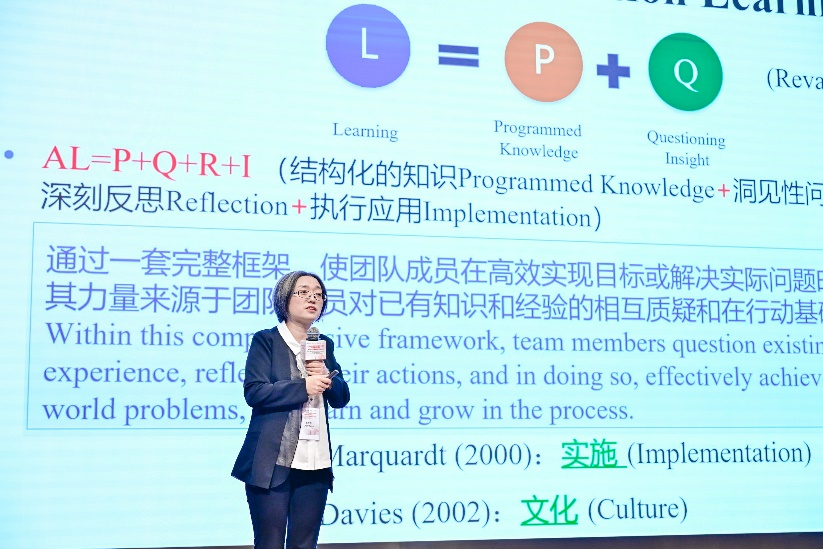
Chen Wansi, Director of the Case Centre of Action Learning, School of Business, East China University of Science and Technology, gives a speech
Zhao Liman, team leader of CEIBS' case researchers, delved into AI and case value innovation from a case researcher's perspective. Her presentation centred on three key questions: why use AI in case innovation, what valuable innovations can AI bring, and how can we apply AI effectively while achieving case value innovation?
Zhao emphasized that the ultimate goal of case studies is to achieve value innovation, a goal that can be partially realised with the aid of emerging technologies like AI. However, she stressed that AI should be viewed as a supporting tool rather than a replacement, due to its current limitations in cognitive reasoning. Recognising both the value of case studies and the unique capabilities of AI, Zhao introduced a "double diamond" model to illustrate the role of AI in case development and teaching from a design thinking perspective.
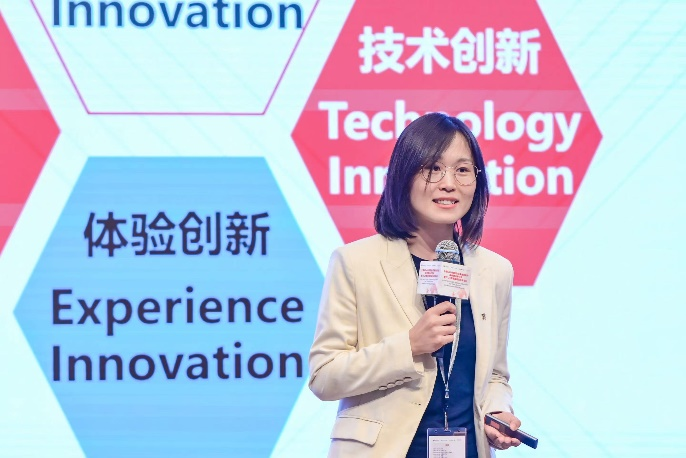
Zhao Liman, team leader of CEIBS' case researchers, gives a speech
The discussions concluded with a presentation by Prof. Wang Taiyuan titled "Real Situation Learning Method: Are Cases the Means or the Ends?" The Real Situation Learning Method (RSLM™), uniquely developed by CEIBS, is based on a structured approach to designing immersive learning experiences. This method allows students to interact directly with company executives in real-world case studies.
Prof. Wang emphasised that RSLM™ relies on the active participation of host companies. This approach not only satisfies students' needs to extend their learning experience, engage in direct interactions with executives, and explore business development opportunities, but also fosters the creation of new case studies. In the context of RSLM™, Wang explained, case studies serve a dual purpose: they are both the means and the ends.
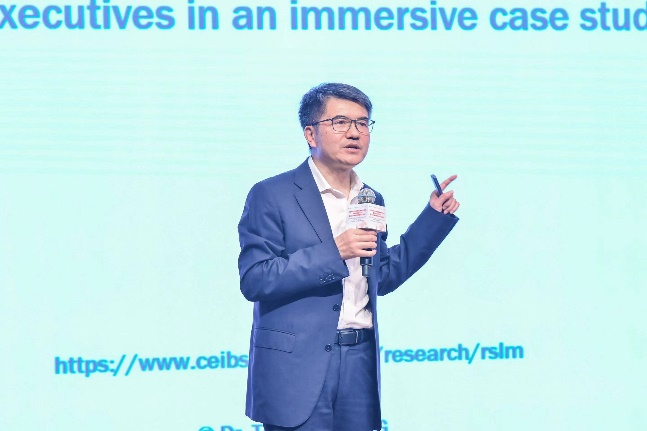
Wang Taiyuan, Deputy Director of DBA Programme and Professor of Entrepreneurship at CEIBS, gives a speech
At the end of the conference, Frank Bournois delivered closing remarks. He celebrated the success of the conference and emphasised the importance of cultural sensitivity, enhancing learning through teaching, and utilising AI as a valuable tool in case development and studies in today's new era. Bournois noted that the insights gained from this international conference confirmed that the case method is more relevant than ever in global business schools.
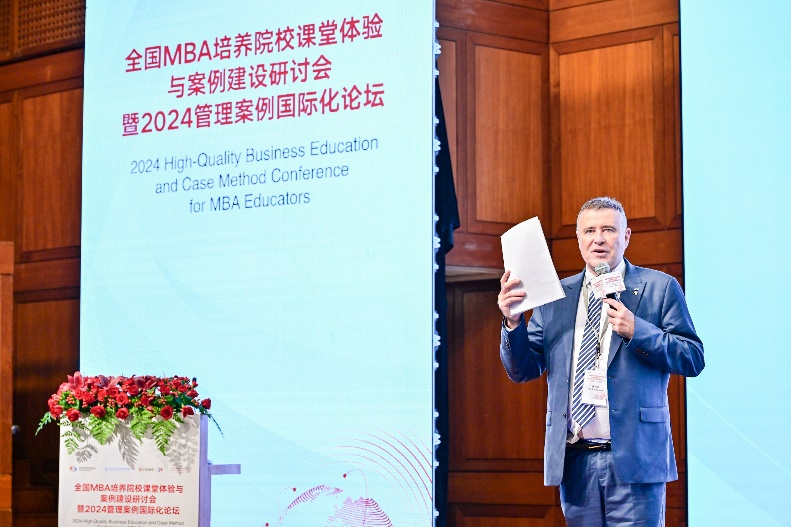
Frank Bournois, Vice President and Dean of CEIBS, gives closing remarks
Wang Ping provided a summary of the conference, celebrating its success. She expressed her gratitude to CEIBS, the guest speakers, and all participants, while also sharing her hopes for the continued high-quality development of case studies in the future.
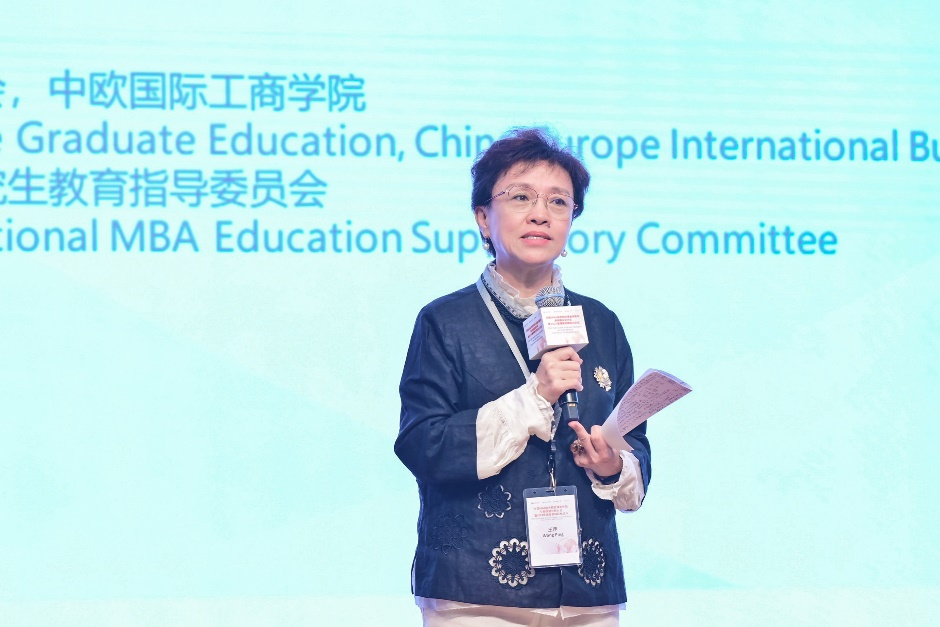
Wang Ping, Director of the Office of Secretariat China National MBA Education Supervisory Committee and Secretary-General of MBA Committee of Association of Chinese Graduate Education, concludes the event
With a focus on China-themed cases, the "2024 High-Quality Business Education and Case Method Conference for MBA Educators" aims to contribute to global management education by improving the quality of MBA case studies and emphasising the critical role of the classroom experience. It also promotes the adoption of China-focused cases in business schools worldwide, encouraging more domestic institutions to prioritise classroom experience and case development. By bringing together experts in management education and case studies from around the globe, the conference has provided valuable insights to enhance the quality of MBA education and expand the global impact of China-focused cases.












